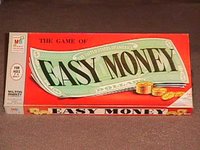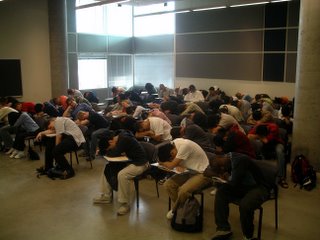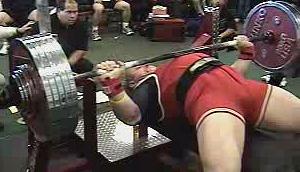Easy money never lasts forever!
 There has been a lot of talk here and on the other blogs about the consumer spending that has been financed through the equity extracted from real estate. But what about the people that make the industry possible? What kind of money have many of these people been making, and what is in store for them?
There has been a lot of talk here and on the other blogs about the consumer spending that has been financed through the equity extracted from real estate. But what about the people that make the industry possible? What kind of money have many of these people been making, and what is in store for them?To answer that question, let's look at the growth in the mortgage industry. Take a look at this chart from the Mortgage Bankers Association which shows the amount of mortgage originations by quarter. An origination is a purchase or refinance loan. I went ahead and added up the quarters to give an 'annual' picture of things.
1990 - 459 billion
1991 - 563 billion
1992 - 893 billion
1993 - 1.020 TRILLION
1994 - 769 billion
1995 - 640 billion
1996 - 785 billion
1997 - 833 billion
1998 - 1.656 TRILLION
1999 - 1.379 TRILLION
2000 - 1.139 TRILLION
2001 - 2.243 TRILLION
2002 - 2.854 TRILLION
2003 - 3.812 TRILLION
2004 - 2.773 TRILLION - 2.92 trillion per IMF Pubs
2005 - 3.120 TRILLION - only 2 quarters data from MBAA so IMF Pubs provided the 2005 data
If you look at this data it is pretty easy to see that as the stock market started cranking in the late 90's so did mortgage originations. Things tailed off in 2000 as interest rates were at their highest point in years. As you can see, 2003 was the largest year on record. Almost 4 trillion dollars worth of loan originations. Your interest only loans started becoming popular in 2002 and they took off in 2003 and beyond. There were almost more mortgage originations in 2002-2005 than there were from 1990-2001.
But what does all this mean?!?!? Let me ask you this (especially the people in California): how many people do you know that could do a loan for you? How many people did you know 3-5 years ago?
I couldn't find the article at the moment to provide a link, but something like 40-50% of the job growth in CA has been in the real estate/mortgage/construction industry since 2000. When you see an industry flooded with money like that, what happens. People run into the business for the money!
The whole point of the above data is to show you the size of the mortgage business. Now that you have seen the amount of money that is out there, you know that there were lots of people making good money.
During the boom times, it was not uncommon for somebody with little to no mortgage experience to make 5-10k in their first month...and some people made much more. You had people making 20, 50, 100k+ a month. Yeah, it was mostly the top dogs making 100k+ a month, but there were lots of them. From what I saw, it was pretty safe to say that most people were making 15-30k a month. I don't have stats or anything to prove this, just what I saw on the 'tracking' boards in offices, and from knowing how much people were making on the loans I was doing for them.
It's funny, I had loan officers that wouldn't "do loan amounts less than 500k". They would pass them on to somebody else because it wasn't worth their time to do anything smaller. But do you want to know what is REALLY funny, I was getting calls from some of these same people a few weeks ago for 150k loans in Florida. I said, "I thought you didn't do the small loans". They said, "very funny...in this market, I'll take what I can get".
I'm also seeing a bit more stress on some people's faces. After several good months in the business, many of these people realized they could get a mortgage, and they were making good money, so why not?!?!? The only problem is that that mortgage is a 30 year commitment. 6-12-18 months of good income doesn't mean you can afford that in the long run. When the 20k a month isn't rolling in so fast, that 4000-6000 a month mortgage starts looming large in some people's eyes. I even had one office where the other loan officers pointed to a guy who was stressing out...and I just watched as he was burning up the phones, dialing for dollars. You could tell he was on a mission. I asked one of the guys "what's up?". He said that the loan officer in question had a $4000 a month mortgage and the holidays were pretty rough for him. Rough in the sense that mortgage production slowed down, and there wasn't a big paycheck at the end of the month.
You could only imagine the stories I would hear from the 5000-10,000 dollar weekends in Vegas. The clothes, the cars, the jewelry...it was everywhere in some of my offices. There were 20-25 yr olds rolling in 745 BMW's, Hummers, 500SL Mercedes, Escalades, etc. You name it. The phones were ringing and there was an energy you felt when you walked in. People were making money, and life was good.
That energy is gone from my best offices. Many of the cubicles that used to be full, are empty. The top people are still around, but they are having to work much harder. Some have been in the business for a while, and knew it would slow down some. Some have never known anything other than the 'boom times'. Of the 'mom and pop' shops that worked out of their homes, or had small offices, some of them have closed their doors, or taken the step towards home office.
I will say this, at the same time when these people were making lots of money...and letting everybody know it. There were the quiet people (I really enjoyed talking with these people). The ones driving an older Honda Civics or pickup trucks. These people usually owned the shop, or had been in the business for a while. I think they knew this wouldn't last, or maybe they just weren't the 'flashy' types. Some of these people are probably set for life after the money they made...and the money they saved.
None of the above is scientific, or applies to every loan officer or broker shop. Everybody is different. There are all sorts of people that are in the business. Some are flashy, some big spenders, some are savers. Some care only about the dollar and nothing else. Some will do a loan that pays less because it is he right thing for the client. Some are a combination of the two depending on the situation.
One thing is for sure, there are 3 things that are going to affect the amount of originations the next few years.
1. interest rates
2. lending standards
3. property values.
If interest rates go up, then there will be less refinancing. If lending standards tighten, there will be less people able to qualify for a loan. If property values decline then the loans will be smaller. Smaller loans mean less commission. Higher rates and tighter lending standards will also affect property values. If the mortgage originations decline, so do a lot of people's paychecks.
Don't get me wrong, there is still plenty of business out there as a whole, but we are returning to a more normal market. I think we are returning to a more normal market that is not going to be able to pay everybody what they are used to being paid. If the market goes back to a 2 trillion dollar market, that is about a 33% cut. That cut is going to have to come out of paychecks, the number of people in the business, or a combination of the two. The established people will stay, some will stick it out, many will leave. I don't know when this will happen exactly, but I think the next 6-24 months are going to be very interesting.
What do you think??
I look forward to the comments and feedback!
SoCalMtgGuy





















